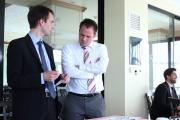Banking is not an industry easily understood. This is why ZEBS chose to partner up with BTI - Business Training International, a market leader of very unique board games, whose visible nature really helps participants to grasp the important concepts of banking. What also turned this seminar into something special was its location: Athens.
The first day kicked off with a small introductory round after which a closer look was taken at the different stakeholders of a bank – such as the central bank, other banks, and shareholders – and their respective interests and goals were discussed. Then, focus turned towards two important preliminaries for every bank: the golden rule of liquidity and the principle of equity coverage of risky assets.
After these theoretical considerations, groups were formed, board game cash was distributed, a banking concession purchased, a bank founded, a strategy agreed upon, employees hired, advertising budget spent. The different groups then got deposits from the (imaginary customer) market and lent loans to customers. According to different interest rates, principals and maturities of those items, the different groups enjoyed a different size of interest gains and losses. The first round was finished by drafting every groups’ balance sheet, profit-loss-statement and checking the liquidity and risk principle.
In the evening, participants had the opportunity to attend a lecture held by a renowned Greek researcher of corporate finance subjects. Based against the current political background, the lecture dealt with the reasons for the financial crises and to what extent those reasons are also responsible for the Greek sovereign debt crises. After those insightful discussions, the day ended with a very excellent dinner at one of the finest international addresses in Athens.
The second day witnessed the second and third round of the Banking board game. Based on the first-round results, the teams had the chance to revisit and amend their strategy. This resulted in every group being more courageous at handling loans, deposits, government bonds, foreign currency bonds and so led to an increase in every team’s bank’s balance sheet.
After three rounds, participants had firmly grasped the central concepts of banking and were able to interpret how different economic factors would influence the results of their bank.
The evening was once again wrapped up with a lecture held by a prolific Greek finance researcher. The lecture touched upon risk management topics such as the Value-at-Risk concept, its usage and limitations and Investments in Commodities.
The seminar’s final day was devoted to financial statement analysis. Groups were given the annual reports of several companies that were planning to issue corporate bonds and the question was asked “Would you buy this corporate bond?” After a general analysis of key financial metrics and the presentation of those results, discussions about how those metrics correlated to each other and how they should be interpreted led to further insights into the revealing power of financial analysis.
In order to celebrate the successful conclusion of this learn-intensive MBA seminar in wonderful surroundings, all participants and lecturers gathered for the last time at a very delicious Italian restaurant with a spectacular night-light view of the sea.
Felix, IMP student







